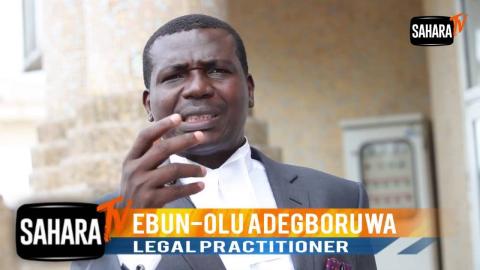
Adegboruwa added that Nigerians are entitled to stable and efficient power supply from the government and the Buhari administration must “crack this seemingly hard nut urgently.”
Human rights lawyer, Ebun-Olu Adegboruwa, SAN, has stated that Nigerians are tired of excuses from the Muhammadu Buhari-led government and want value for their votes.
Adegboruwa added that Nigerians are entitled to stable and efficient power supply from the government and the Buhari administration must “crack this seemingly hard nut urgently.”

The lawyer, in a release titled, “Government in power without power” obtained by SaharaReporters, noted that if Nigeria was supplying power to Niger Republic, then there should be no excuse for failure at home.
He said, “The All Progressives Congress will; generate, transmit and distribute from current 5,000 to 6,000 MW to at least 20,000 MV of electricity within four years and increase to 50,000 MW with a view of achieving 24/7 uninterrupted power supply within ten years, whilst simultaneously ensuring development of sustainable/renewable energy. This was from the manifesto of the APC, submitted to the people of Nigeria in the wake of the 2015 general elections.
“Power generation is the main issue in regard to the socio-economic development of any nation. In Nigeria however, successive governments have deployed it for political gains, knowing the importance that Nigerians attach to it. For instance, I have never experienced electricity supply in my home town since I was born, as we are not connected to the national grid at all.
“Indeed, the entire Ondo South Senatorial District was disconnected from the grid about 12 years ago even though attempts are underway to reconnect. Several towns and villages are like my home town, locked out of any form of development at all, yet we are classified as oil producing. Last week, the national grid collapsed for the umpteenth time. I placed an order for the replacement of a generator and got an invoice of about N5million, just for a 30-KVA version. “To change the inverter batteries would also cost a fortune. This is the sordid tale of most Nigerians.
“The impression that our leaders in power have conveyed to us is that it is practically impossible to have stable and permanent power supply; that we don’t have the resources to build the needed energy plants that will meet the needs of all Nigerians; that we must accept generators as second nature, if we must function and survive, as a people. Churches, Mosques, banks, schools, small businesses, factories, government ministries and departments, police stations, the courts and even the Power Holding Company of Nigeria itself, all depend on generators.”
Adegboruwa noted that the average “experience of those depending upon public power supply is that of total frustration, resulting from absence of any supply at all, irregular supply, low voltage, high voltage, load shedding, constant blackouts, extortion by members of staff of the companies involved and naked corruption.”
He added, “It was this terrible scenario that the APC promised to change when it was canvassing for votes in 2015, but now, six years in office, all we get is one story after another, leading to the usual blame game of failure of past regimes. From the manifesto of the APC, the federal government was to generate at least 5,000 MW of electricity yearly, with equal capacity to transmit and distribute it.
“Whilst commissioning traffic lights in Lekki Phase 1 in Lagos on November 12, 2014, Babatunde Fashola, SAN, as Governor of Lagos State then, had asserted that any serious government will fix the power problem in six months. In clearly a matter of fate, Fashola was subsequently appointed minister in charge of power, after the 2015 elections. He could not fix it in four years. He had power but could not deliver power.
“From all the foregoing therefore, I have reason now to believe that our leaders use epileptic power supply as an instrument of oppression, to frustrate Nigerians, to halt their development initiatives, to collapse their industries and investments, to the extent that they would have no other alternative than to surrender to the programmes and policies of the ruling government.
“All that the average Nigerian wants is stable and efficient power supply. If Nigeria is supplying power to Niger Republic, then there can be no excuse whatsoever for failure at home, other than the fact that it may be a conspiracy against the masses of our people. The Buhari administration must crack this seemingly hard nut, urgently.
“The campaign now for all Nigerians should be that of Power for Power. If you cannot provide POWER (electricity) to better our lives and develop ourselves, then you are not entitled to POWER (governance) to better your pockets. It is as simple as that. We have shown enough patience waiting for the promise of 2015. We are now tired of excuses and want value for our votes.”
Nigerians Are Tired Of Excuses – Adegboruwa Slams Buhari Regime Over Epileptic Power Supply
Human rights lawyer, Ebun-Olu Adegboruwa, SAN, has stated that Nigerians are tired of excuses from the Muhammadu Buhari-led government and want value for their votes.
Adegboruwa added that Nigerians are entitled to stable and efficient power supply from the government and the Buhari administration must “crack this seemingly hard nut urgently.”
The lawyer, in a release titled, “Government in power without power” obtained by SaharaReporters, noted that if Nigeria was supplying power to Niger Republic, then there should be no excuse for failure at home.
He said, “The All Progressives Congress will; generate, transmit and distribute from current 5,000 to 6,000 MW to at least 20,000 MV of electricity within four years and increase to 50,000 MW with a view of achieving 24/7 uninterrupted power supply within ten years, whilst simultaneously ensuring development of sustainable/renewable energy. This was from the manifesto of the APC, submitted to the people of Nigeria in the wake of the 2015 general elections.
“Power generation is the main issue in regard to the socio-economic development of any nation. In Nigeria however, successive governments have deployed it for political gains, knowing the importance that Nigerians attach to it. For instance, I have never experienced electricity supply in my home town since I was born, as we are not connected to the national grid at all.
“Indeed, the entire Ondo South Senatorial District was disconnected from the grid about 12 years ago even though attempts are underway to reconnect. Several towns and villages are like my home town, locked out of any form of development at all, yet we are classified as oil producing. Last week, the national grid collapsed for the umpteenth time. I placed an order for the replacement of a generator and got an invoice of about N5million, just for a 30-KVA version. “To change the inverter batteries would also cost a fortune. This is the sordid tale of most Nigerians.
“The impression that our leaders in power have conveyed to us is that it is practically impossible to have stable and permanent power supply; that we don’t have the resources to build the needed energy plants that will meet the needs of all Nigerians; that we must accept generators as second nature, if we must function and survive, as a people. Churches, Mosques, banks, schools, small businesses, factories, government ministries and departments, police stations, the courts and even the Power Holding Company of Nigeria itself, all depend on generators.”
Adegboruwa noted that the average “experience of those depending upon public power supply is that of total frustration, resulting from absence of any supply at all, irregular supply, low voltage, high voltage, load shedding, constant blackouts, extortion by members of staff of the companies involved and naked corruption.”
He added, “It was this terrible scenario that the APC promised to change when it was canvassing for votes in 2015, but now, six years in office, all we get is one story after another, leading to the usual blame game of failure of past regimes. From the manifesto of the APC, the federal government was to generate at least 5,000 MW of electricity yearly, with equal capacity to transmit and distribute it.
“Whilst commissioning traffic lights in Lekki Phase 1 in Lagos on November 12, 2014, Babatunde Fashola, SAN, as Governor of Lagos State then, had asserted that any serious government will fix the power problem in six months. In clearly a matter of fate, Fashola was subsequently appointed minister in charge of power, after the 2015 elections. He could not fix it in four years. He had power but could not deliver power.
“From all the foregoing therefore, I have reason now to believe that our leaders use epileptic power supply as an instrument of oppression, to frustrate Nigerians, to halt their development initiatives, to collapse their industries and investments, to the extent that they would have no other alternative than to surrender to the programmes and policies of the ruling government.
“All that the average Nigerian wants is stable and efficient power supply. If Nigeria is supplying power to Niger Republic, then there can be no excuse whatsoever for failure at home, other than the fact that it may be a conspiracy against the masses of our people. The Buhari administration must crack this seemingly hard nut, urgently.
“The campaign now for all Nigerians should be that of Power for Power. If you cannot provide POWER (electricity) to better our lives and develop ourselves, then you are not entitled to POWER (governance) to better your pockets. It is as simple as that. We have shown enough patience waiting for the promise of 2015. We are now tired of excuses and want value for our votes.”